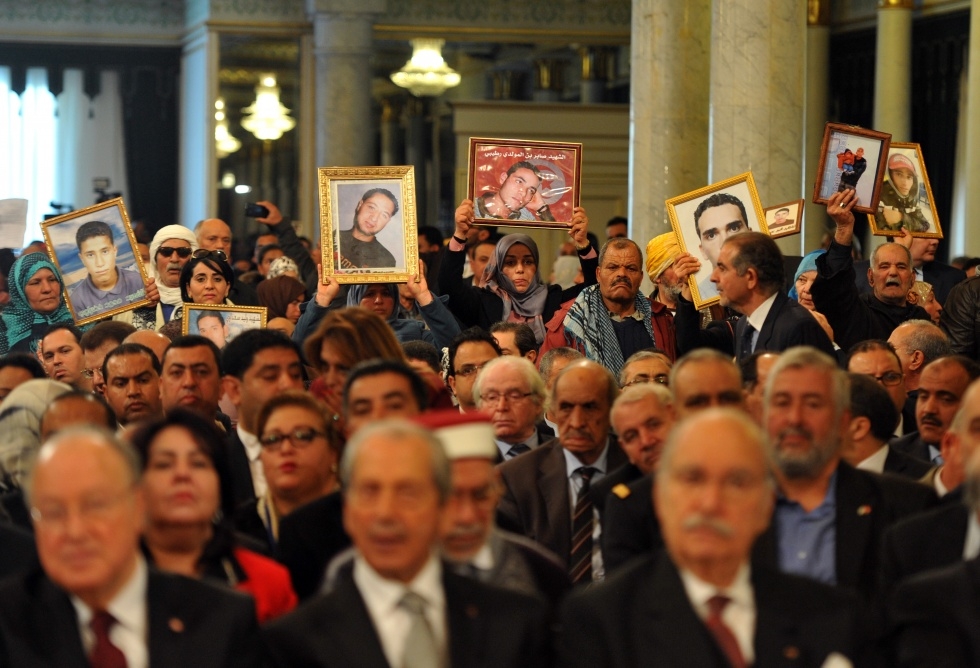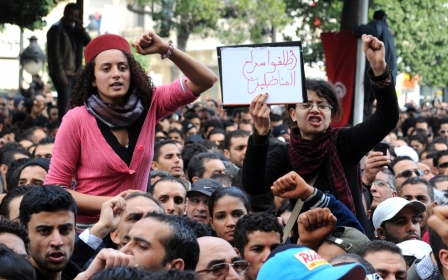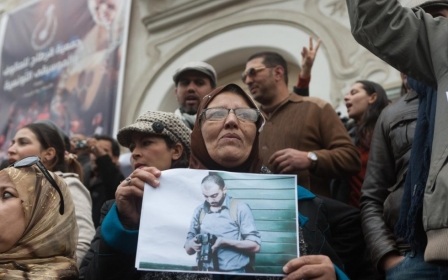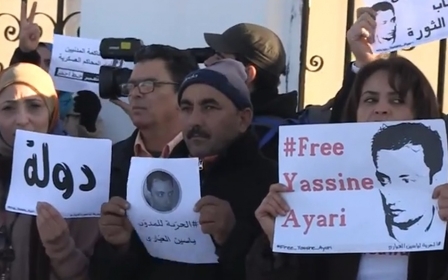Relatives of Tunisia's revolution victims cause chaos at anniversary celebrations

Celebrations for the anniversary of Tunisia’s 2011 revolution were ended early on Wednesday night, after the families of those killed during the uprising staged a demonstration during the President’s speech.
Beji Caid Essebsi, who heads the Nidaa Tounes party was sworn in as president last month, was speaking at a celebration held at Carthage Palace in Tunis, to mark the fourth anniversary of the 'Freedom and Dignity Revolution'. “The youth [who led the revolution] had no leaders, and they had no ideology, either religious or political. Nor did they have links to any foreign powers,” Essebsi told the audience assembled at the grand palace, bedecked in chandeliers.
During the speech, Essebsi vowed to continue working to solve the problems that led to the revolution, stressing that he is committed to “transitional justice” and preventing any return to one-party rule.
However, Essebsi was interrupted by shouts from relatives of those who were killed and injured during the month-long struggle to topple strongman President Zine el-Abidine Ben Ali.
“Where is the justice for our children?” protesters shouted as Essebsi struggled to continue his speech.
Spectators reported that Essebsi, an 88-year old whose decades-long career included a stint working under Ben Ali, was shaken by the protest.
Attempting to continue his speech, he spoke directly to the demonstrators, telling them that “if the martyrs had been here, they would have rejected such behaviour”.
After he resumed his speech Essebsi was cut off again, finally opting to leave the stage early, telling the families “all the martyrs will be honoured – what you are doing is unnecessary”.
“This is a sham,” Majbouba al-Nasri, a widow whose husband was killed in 2011, told Arabic news site al-Araby al-Jadid. “We didn’t come here to hear a pompous speech – we came to honour, symbolically at least, those we have lost.”
More than 300 people were killed and 2,000 injured during the uprising, which began in late December 2010 and ended on 14 January 2011 when Ben Ali officially stepped down, subsequently fleeing to Saudi Arabia.
The demonstration came days after a Human Rights Watch report found that Tunisia's judicial system had "failed to deliver justice for the victims" of the uprising.
Fifty-three people, including senior officials and Interior Ministry politicians, have been tried before military courts for their role in the violent suppression of protests. However, according to the report, "legal and investigative problems" marred the trials, which resulted in acquittals or lenient sentences.
After the ceremony ended, Essebsi's office released a statement admitting that families of the dead had been let down by the system.
According to the statement, Essebsi "understands" their protest, explaining that "some apsects of their situation have remained unresolved in the last years".
Outside the Presidential Palace, separate protests organised by different political factions broke out in the streets of the capital, which were the scene of heightened security on Wednesday.
Rachid al-Ghannoushi’s of the opposition Ennahda Party marked the date with speeches and anthems, while in a nearby street their political rivals from the Popular Front called for Ennahda politicians to be investigated over the 2013 assassination of a Popular Front official.
Ennahda is seen as the country's branch of the Muslim Brotherhood, which won the country's first post-revolutionary vote in 2011. The Popular Front is an electoral alliance of leftist parties that was formed in 2012.
In a third demonstration, protesters gathered to demand the release of Yassine Ayari, a popular blogger sentenced in absentia to three years in jail last November, on charges of defaming the army.
Middle East Eye propose une couverture et une analyse indépendantes et incomparables du Moyen-Orient, de l’Afrique du Nord et d’autres régions du monde. Pour en savoir plus sur la reprise de ce contenu et les frais qui s’appliquent, veuillez remplir ce formulaire [en anglais]. Pour en savoir plus sur MEE, cliquez ici [en anglais].




